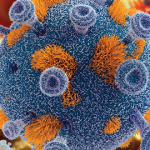Aging and Arteritis
Aging is enough of a challenge without having to deal with the burden of a rheumatologic disease such as giant cell arteritis (GCA) or RA. Our colleagues, Jorg Goronzy MD, and Cornelia Weyand MD, both professors of medicine at Stanford University in Palo Alto, Calif., have proposed some interesting theories to explain the link between these diseases and the aging immune system.3 Age, the strongest of all risk factors for GCA, impacts the two major elements that interact to cause vascular inflammation, namely the innate and adaptive arms of the immune system and the unique microenvironment of the vessel wall. The authors propose that GCA may be a disease of uncontrolled dendritic-cell (DC) and T-cell activation in a tissue site that is ordinarily inaccessible to immune responses. As the host ages, the tissue site itself undergoes numerous structural changes, summarized as vascular aging. This process brings with it changes in elastic fibers and matrix proteins and remodeling of the medial and intimal layer, affecting cellular traffic, turnover, and survival. Perhaps the infectious load of the aging host triggers activation of vascular DCs that can no longer protect the structurally altered vascular wall, giving rise to tissue-injurious inflammation. I guess the warranty for functioning DCs expires after 50 years of service!
Aging and RA: Shortened Telomeres and a Shrinking Thymus
In patients with RA, it has been noted that T-cell generation is inappropriately low, matching that of healthy individuals who are 20 to 30 years older. Consequently, homeostatic T-cell proliferation is greater, resulting in the premature senescence of T cells. Some of this decline in T-cell production in patients with RA has also been ascribed to premature involution of the thymus, which causes this diminutive organ to shrink beginning in childhood.
Remember the telomere? Perhaps you slept through your genetics classes? During cell division, enzymes that duplicate DNA cannot continue their duplication all the way to the end of chromosomes. If they did, cells would lose the ends of their chromosomes and the encoded genetic data. Serving in a role equivalent to football linemen are the telomeres. These are regions of repetitive nucleotide sequences that were first discovered in 1978 by Elizabeth Blackburn, PhD, who was working as a postdoctoral student at Yale. Dr. Blackburn, currently professor of medicine at the University of California at San Francisco, along with Jack Szostack, PhD, professor of medicine at Harvard Medical School in Boston, and Carol Greider, PhD, professor of medicine at Johns Hopkins University in Baltimore, were awarded the 2009 Nobel Prize in Medicine for their work elucidating the role of telomeres.



